10
FLIES AND HUNGRY PEOPLE
Vulture stalked white piped lie forever wasted
your life in lack-and-white Kevin Carter
from ‘Kevin Carter’ by the Manic Street
Preachers, Sony Music/Columbia, August 1996

March 1993
Kevin’s eyes could not be misinterpreted when Joao
told him that he was prepared to go to Sudan. Kevin wanted to go
too, it was his chance to escape the web of problems he felt
trapped in.
For Kevin, the war in Sudan - said to be a genocide
of the Christian Dinka and Nuer tribes by the Islamic government -
was a chance to free himself of his crazy infatuation. So one-sided
was the relationship that a desperate love letter he had dropped
off at the woman’s house was read out to the guests at a dinner
party she was giving, leaving them uncomfortably amused. He also
wanted to get off the white pipe. Sudan seemed to present the
possibility of making everything right and revitalizing his career,
which seemed to have come to a dead-end at the cash-strapped
Weekly Mail. The newspaper had not been interested in the
Sudan trip and insisted he take leave if he wanted to go.
Kevin approached various people for whom he had
freelanced in the past. Paul Velasco, then owner of the South
African photo-agency
SouthLight (now renamed as PictureNet Africa), advanced him some
money, as did Denis Farrell at the AP; he also borrowed some from
me. Combined with his salary, this was enough to cover the air
ticket and hotel accommodation while still meeting his commitments
back home.
Kevin was on a high, motivated and enthusiastic
about the trip. He was on the rebound from his spectacularly
unsuccessful relationship when he met Kathy Davidson at a party. A
good-looking, intelligent and pleasant school teacher - the perfect
antidote to his usual choice of hard-edged women. Kathy found him
intriguing and attractive, and let him have her telephone
number.
For Joao, the excursion was a chance to expand his
career. He was still working at The Star when a former
photographer, Rob Hadley, who had taken a job with the United
Nations’ Operation Lifeline Sudan project, had offered him and
Kevin the chance to get into southern Sudan with the rebels. Joao
had jumped at the offer, and began making the arrangements.
Newsweek Magazine had promised money-a guarantee to secure a
first look at the pictures. When Joao approached Ken to get leave
for the trip, Ken instead secured Joao an assignment from The
Star’s foreign news service. If his pictures from Sudan were as
strong as those from his self-funded trip to Somalia the previous
year, it could lead to other assignments with major international
magazines. His dream of being a war-photographer beyond the borders
of South Africa had begun to materialize.
Fax messages from Rob stressed the latest downturn
in Sudan - the major rebel factions had split into tribally based
groupings with the result that entire villages had been massacred
by opposing tribal militia, and the government had seized the
opportunity to launch a massive offensive against the divided
rebels. The part of southern Sudan that Joao and Kevin wanted to
get to was an especially vulnerable area in the remote hinterland
dubbed the ‘the Famine Triangle’ by aid workers.
The Southern tribes of Sudan are Christian or
animist and had been grouped together under the rebel umbrella
group, the Sudanese People’s Liberation Army (SPLA). They had been
fighting for
autonomy from the Khartoum government, which had been dominated by
Islamic northerners ever since independence in 1956. The low-key
war had been spurred to new intensity in the 80s by the
government’s adoption of Islamic Sharia Law. The story which Joao
and Kevin hoped to cover was the recent bloody split in the SPLA.
Sudan is a notoriously difficult country to work in, with a
government that refuses journalists entry to the south, and rebels
that are either pressshy or expert at manipulating the prying eyes
of outsiders. The breaking and forging of alliances makes it
difficult to predict the situation from one week to the next, and
aid organizations have great difficulty in getting food aid in with
any regularity.
Kevin and Joao prepared carefully for the trip. The
day before they left for the Kenyan capital of Nairobi - the best
transit point for trips to southern Sudan - they met at Kevin’s
rented house in the Johannesburg suburb of Troyeville. Kevin’s
entire bedroom was covered by numerous packets and bags. Ken had
accompanied Kevin on a shopping trip for everything from mosquito
nets to dehydrated food - they did not know what they might need.
Joao and Kevin sat on the bed, laughing and excited, and shared a
joint. Ken was drawn into their excitement, and took a picture,
then left them to finish their packing.
The next day, after a five-hour flight north, Kevin
and Joao arrived in Nairobi and went to the Parkview Hotel, one of
the cheaper, rather dingy, hotels that cater to backpackers and
other budget travellers. To economize, they shared a room that
enjoyed a view of a muddy alley. The telephone only reached as far
as the lethargic receptionist and there was no television.
It was a Sunday in Nairobi and deathly quiet. They
went for a walk, Kevin hyper-active, striding and talking fast.
They ended up drinking beer on the colonial Oaktree Hotel’s
veranda, watching the tropical sun set over the city. Kevin was
excited and happy to be in Nairobi, and they were both looking
forward to getting to Sudan.
The next day things started going wrong. Kevin
tried to change a 100-dollar bill and the bank rejected it - it was
a counterfeit. They contacted Rob at the Operation Lifeline Sudan
headquarters at Girgiri
on the outskirts of Nairobi, but further disappointment was in
store for them. The plan had been that they would fly in on a food
drop, and spend about a week on the ground before being picked up
on the next food delivery, but an upsurge in fighting meant it was
unsafe for the planes to land, and the aid flights had been
suspended. Their trip was put on hold - indefinitely.
Every day they went out to the UN compound to see
if the situation had changed, but for five days they got the same
negative answer. The disappointment built up in the tiny hotel
room. Joao was furious, unhappy. All his careful planning was going
down the toilet. Time passed slowly and painfully; they spent
sparingly and ate in increasingly cheap restaurants. They did the
rounds of the aid agencies, to see if any of the other
organizations were flying in, despite the fighting. They abandoned
the more expensive personal taxis and began using matatus - the
colourful local minibus taxis which pack in up to 20 passengers.
The drivers seemed to be in competition as to who could fit the
largest disco speakers in their vehicles. When the buses were very
full, the speakers would serve as seats, and on one such crammed
trip Kevin had to sit on a speaker. The reggae that blared out of
the speaker was too loud for anyone to speak and be heard, so Kevin
sat back with an amused look of contentment, and took the
occasional picture through the window with his cherished old Leica
M3.
In spite of their lack of progress, Kevin was
having a good time. All he could talk about was how this trip was
going to work out and how everything was going to be great. He made
plans to resign from the Weekly Mail, go freelance and
pursue a relationship with Kathy - get some stability in his life.
Joao, on the other hand, was uptight. The pressure was getting to
him, he had sold the trip to The Star and Newsweek on
the strength of combat images, and there he was, stuck in Nairobi
with little hope of getting near the fighting any time soon.
Then suddenly there was a UN trip to Juba-a
besieged, government-held town in the south of Sudan. A barge
carrying food aid had been travelling up the Nile and had finally
made it to Juba. It was an ‘in-and-out’, a one-day affair. Since
Kevin had the guarantee from
the AP, the UN put him on the plane flying in. There was no room
for Joao, who had to stay behind. He was livid. Joao had done most
of the preparatory work, set up the main part of the trip, and
Kevin, who had mostly just followed his lead, was getting into
Sudan while he cooled his heels. He assumed the worst: this was it
- there would be no other chance to get to Sudan and he would
return home without having shot a frame.
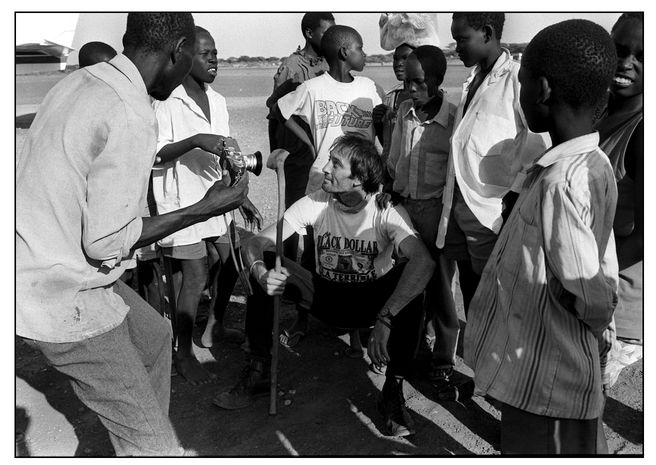
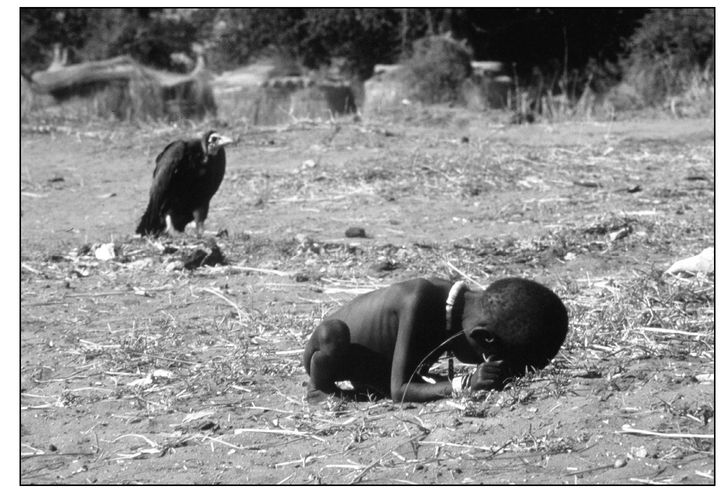
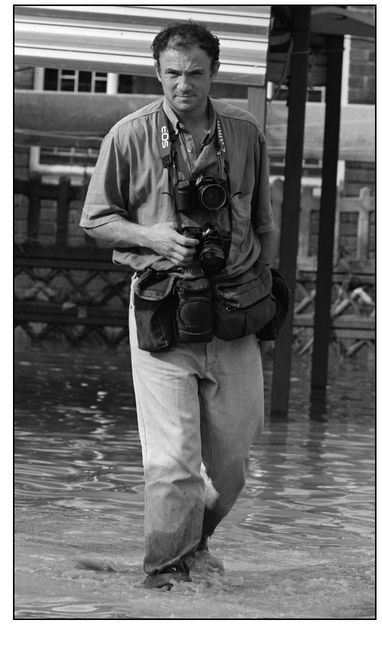
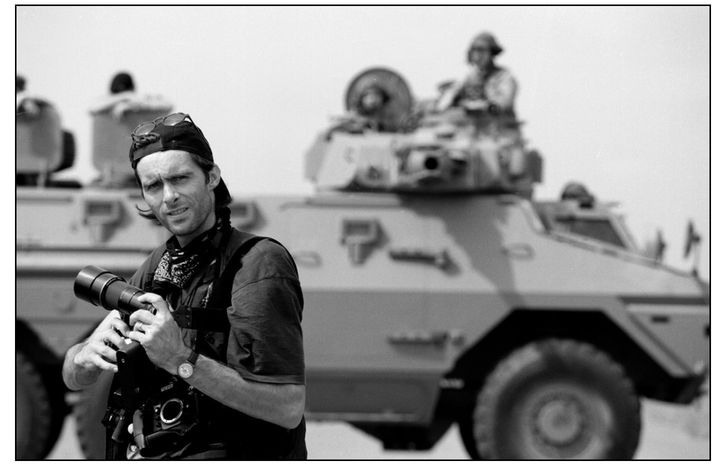
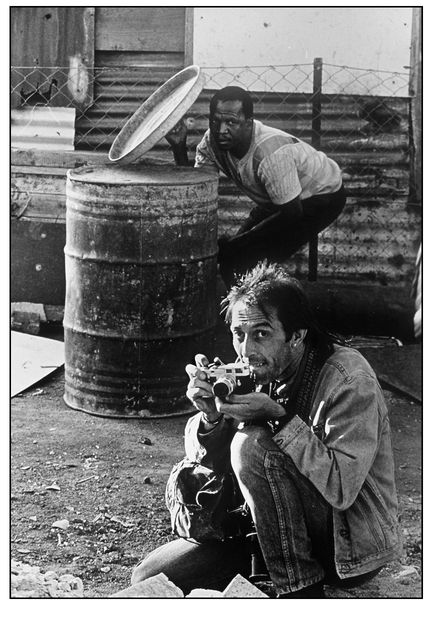
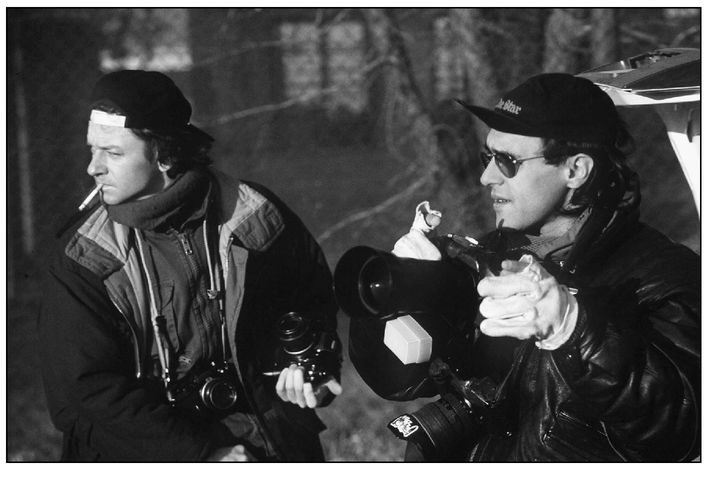

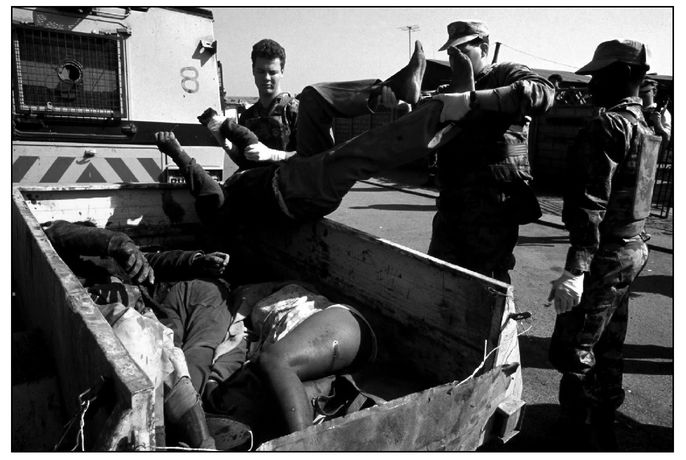
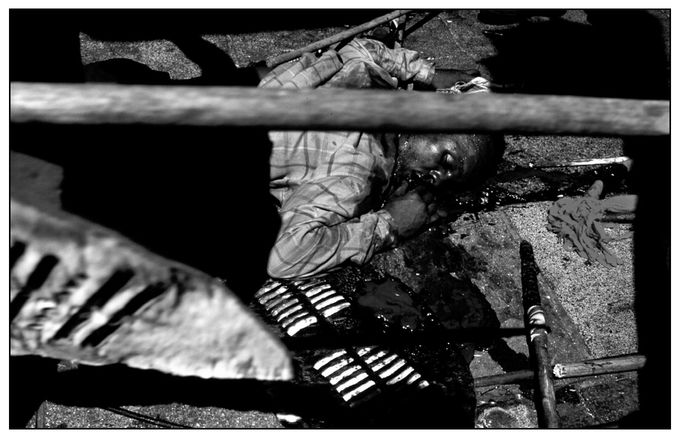
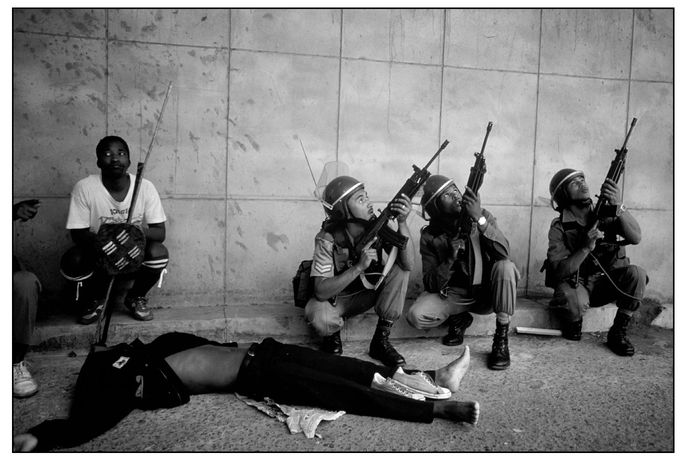


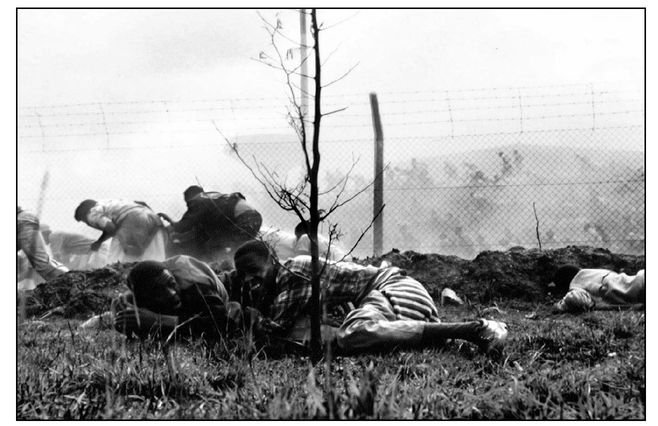
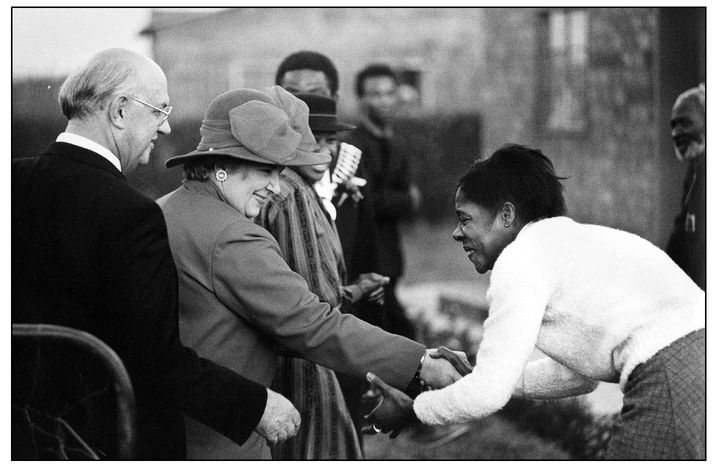
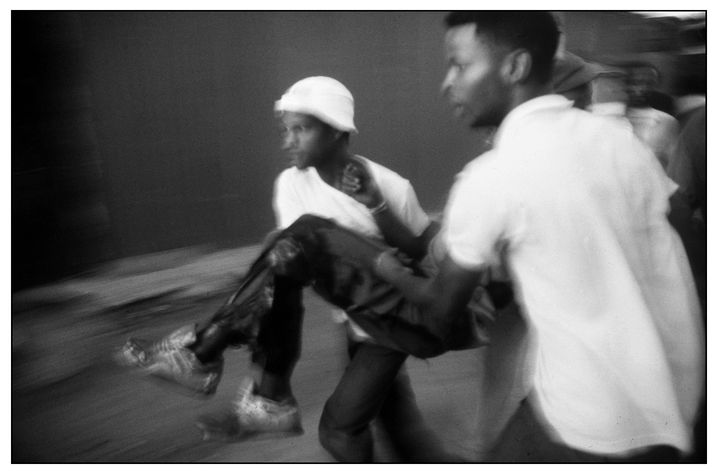
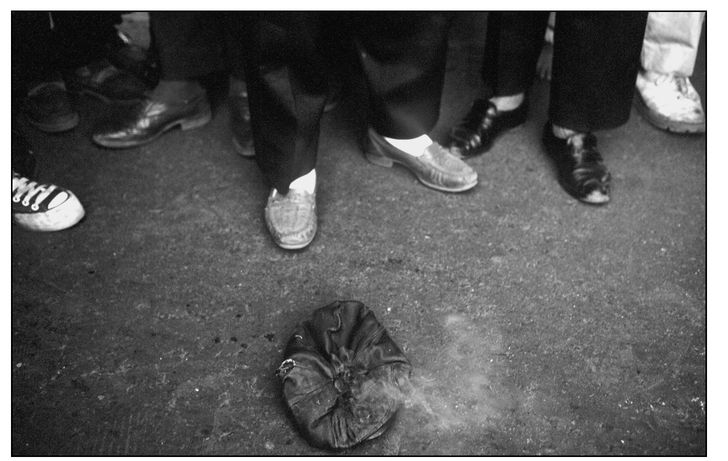

Kevin Carter plays with children as a local
villager looks at his camera in the Kenyan border settlement of
Lokichokio, March 1993. (Joao Silva)

A vulture seems to stalk a starving child in the
southern Sudanese hamlet of Ayod, March 1993. This picture would
win Kevin Carter the Pulitzer Prize for Feature Photography. (Kevin
Carter/Corbis Sygma)

Left:
Greg Marinovich covering floods in the Kwa-Zulu
Natal town of Ladysmith, 1996, shortly before he left to take up a
post in Jerusalem for the Associated Press. (Joao Silva)

Below:
Ken Oosterbroek, with a South African Defence
Force armoured vehicle behind him, during the fall of the homeland
of Ciskei, February 1994. (Joao Silva)

Right:
Kevin Carter crouches while covering clashes
between the ANC and Inkatha in Alexandra township, Johannesburg.
(Guy Adams)

Below:
Gary Bernard, left, and Joao Silva on a winter
morning in Soweto township, July 1994. (Greg Marinovich)

Three dead men lie in the street where they were
gunned down during a battle between Inkatha and the ANC in Soweto’s
Dobsonville suburb. The graffiti reads ‘Remember - Life owes you
nothing - you owe everything to
life!!!’ (Joao Silva)

Policemen load corpses into an open trailer after
a night’s violence between ANC and IFP supporters in Thokoza, July
1993. Sixty people were killed in the township that weekend. (Joao
Silva)

An Inkatha supporter lies dead amongst his
traditional Zulu weapons after several hundred warriors tried to
storm the ANC’s headquarters, Shell House, during a march in
downtown Johannesburg, 1994. Several Zulus were killed, and it
became known as the Shell House Massacre. (Greg Marinovich)

Another Inkatha supporter lies dead, with his
shoes taken off for his journey to the next world, as soldiers look
for the sniper who killed him during the Shell House Massacre.
(Greg Marinovich)

Kevin Carter during a late night shift as disk
jockey at the Johannesburg station, Radio 702. (Joao Silva)

The print-ready artwork from the article entitled
‘Bang-Bang Paparazzi’, which featured in the South African
magazine, Living, that led to a subsequent article called
‘The Bang-Bang Club’, featuring Kevin Carter, Greg Marinovich, Ken
Oosterbroek and Joao Silva. (Joao Silva)

Bisho, 1993. Ciskeien homeland soldiers opened
fire on tens of thousands of ANC supporters who marched across the
South African border to demand the Ciskei disband. Some 26 ANC
marchers were killed. (Greg Marinovich)

Then State President of South Africa, PW Botha,
and his wife Elize, are greeted by a woman in the black township of
Sebokeng, south of Johannesburg, in the late 1980s. (Ken
Oosterbroek / The Star)

ANC fighters carry a wounded comrade during
clashes with Inkatha supporters in Alexandra township,
Johannesburg. (Kevin Carter/Corbis Sygma)

Smoke rises from a cap of an ANC self-defence-unit
member shot in the head at pointblank range after he mistakenly
opened the door to Inkatha gunmen in the dead zone in Thokoza
township, 1995. Four other ANC militants were killed. (Greg
Marinovich)
What Joao and Kevin did not know was that the UN
was having great difficulties in securing funding for Sudan. An
appeal earlier in the year for 190 million dollars had barely
raised a quarter of that. The UN hoped to publicize the famine in
which hundreds of thousands of southern tribesmen faced starvation.
Without publicity to show the need, it was difficult for aid
organizations to sustain funding. There is nothing like a disaster
to boost an aid agency’s profile, and they needed to have the media
cover the existence of the emergency. There are those who insist
the war in Sudan would have ended decades ago if food and other aid
had not been allowed to sustain the fighters; that the aid agencies
and their food were manipulated, used by both government and rebels
as a weapon of blackmail against the civilians in their areas of
control, but Joao and Kevin knew none of this - they just wanted to
get in and shoot pictures.
Kevin flew off to Juba while Joao sat brooding in
the depressing hotel room. It was still daylight when Kevin
returned. The trip had been a waste of time, he told Joao. They had
landed, been taken to a pier on the While Nile, shown a barge with
food being unloaded, suffered through a press briefing - and that
was it. Despite the barge having had to travel for two months up
the great river, during which it had been raided for over half of
its cargo by famine-stricken people on the way, the only half-way
interesting pictures Kevin found were of children scrambling for
some grain that had spilled on to the dock. Kevin tried to
alleviate Joao’s sour mood by showing him the negatives to prove
just how useless the trip had been. Though Joao realized he had
missed nothing, the knowledge did not make him feel any better.
Joao was given to omens and they were looking pretty bad at that
moment.
They decided to give it two more days and if
nothing changed, they would head home. But then they received the
news they had been waiting for: one of the rebel factions had given
permission for the UN to fly in. In addition to the cargo plane
carrying the food, Rob was going in on a light plane to assess the
situation on the ground. Joao and Kevin were welcome to join him,
but there was no guarantee as to when they could be picked up
again. The following afternoon they were in the air, once again
buoyant at the change in their fortunes. Three hours later, they
landed just inside Kenya’s northern border, at the settlement of
Lokichokio, just a few hundred metres from Sudan. Lokichokio was a
tent-city, an UN forward-base for the big Hercules cargo aircraft
that flew food and medical supplies into the famine areas.
Kevin and Joao were allocated a tent, then they had
dinner out in the open, under a crystalline African sky. Dinner was
good and the beer was cold, and they hoped to have more under the
seamless canopy of stars, but the bar closed soon after ten. Back
in their tent they could not sleep - too much excitement, too many
thoughts of what might happen to them tomorrow.
‘What do you think is waiting for us there?’ Kevin
asked, his voice loud in the dark silence that had settled on the
camp. Joao could see Kevin’s profile, lit by the glowing tip of his
cigarette.
‘Flies and hungry people, from what I’ve heard,’
Joao replied.
Their conversation skipped from topic after topic,
but unlike all other similar conversations Joao had persevered
through with Kevin, this time it was all positive. No
self-indulgence, no self-pity. The future looked bright: Kevin was
confident that the trip would be successful, that he would be able
to cover his costs and make some money. This new girl, Kathy, was
going to be just right for him. But mostly they spoke about South
Africa, their work, the violence and where the country was heading
in the coming years and the upcoming vote. The first elections that
all South Africans could finally take part in were just 13 months
away.
The conversation came around to Kevin’s tattoo. He
had a
misshapen map of Africa drawn on his right shoulder, clearly the
work of an amateur. Joao told him he had seen better tattoos on
convicts. Joao also had a tattoo on his right upper arm showing a
winged angel, with the motto ACCEPT NO LIMITS on unfurled scrolls.
It was also less than fantastically well drawn, but it was a work
of art compared to Kevin’s.
After a lengthy discussion of tattoos, they decided
Kevin’s should be re-done, reshaped so that the continent would
look like the real thing, all in black, but with a single red tear
coming out of South Africa and spilling on to his arm. The tear
would somehow signify Kevin’s own pain as well as the pain of those
whom he had photographed. They laughed that it would at least look
better than his current tattoo. The pilot, who was trying to sleep
in the adjoining tent, pleaded with them to keep quiet. They
lowered their voices, noticing that dawn was not far off - they
could hear the sounds of workers preparing breakfast.
Two hours later, their plane touched down in the
tiny southern Sudanese hamlet of Ayod. It taxied to a halt at the
end of the dirt airstrip and the pilot turned the plane in to
position for a quick take-off, should it prove necessary. Half-way
through the turn the front of the little plane lurched to an abrupt
halt. They climbed out and saw that the front wheel had sunk into
thick sand and the plane was stuck. It was nothing serious, the
plane was undamaged, and they had started to push it out of the
beach-like sand when they saw the massive cargo plane approaching.
The cargo plane was making its approach for descent. Fortunately,
dozens of Sudanese had come to greet the plane, the sound of
aircraft meant food, and they quickly helped to wheel the little
plane off the runway, averting what could have become a complicated
situation.
As the cargo plane landed, its giant propellers
raised a storm of sand and pebbles. The Sudanese crouched low
alongside the runway, braving the hot, stinging blasts to be nearer
the food. There is never enough food in these circumstances to feed
everyone and the hungry villagers rushed the plane to try to ensure
that they got their share of nutritious biscuits and maize meal.
Those too weak to get to the runway
had to rely on the aid workers for food. Some 200 metres from the
runway, a low brick building from which the food aid was
distributed stood out among the surrounding conical huts made of
long thatching grass. That was Ayod. The first food consignment
after months without aid attracted a pushing crowd of hungry
Sudanese. They wore patched rags or walked around naked. Mothers
who had joined the throng waiting for food left their children on
the sandy ground nearby. The small food aid building also served as
a clinic and was full of ill and starving people. There were those
who needed special care if they were to survive, and others that
could only be comforted before they died. Kevin and Joao separated.
There were pictures everywhere. Once in a while, Kevin would seek
out Joao to tell him about something shocking he had just
photographed. In one of those foul-smelling rooms, Joao saw a
skinny child lying spread-eagled on the dirt floor. It was dark and
he struggled with the light, trying to get a frame. Kevin joined
him and went down on to his knees to shoot the picture; he then
looked up at Joao, wide-eyed. Despite all the happy anticipation of
the night before, all the excitement had disappeared now that he
was witnessing the effects of the war-induced famine.
Joao left the room. He wanted to find rebel
soldiers who could take him to someone in authority. Their plane
would take off in an hour and they needed to secure rebel
permission to stay on. Joao found a group of fighters. They were
dressed in rags, the only indication that they were indeed soldiers
were the AK-47 assault rifles hanging limply from their shoulders.
Kevin joined Joao and they tried talking to a rebel with deep
traditional scars etched vertically on his cheeks, but the fighter
spoke no English and communication rapidly broke down. They kept
frozen grins on their faces as they tried to mime their way through
the conversation. The only thing that was apparent was that the
rebel had developed an interest in Kevin’s wristwatch. Somehow,
Kevin gave the rebel his watch. Joao was surprised, but understood
Kevin to be giving the soldier the cheap watch in an effort to ease
his conscience about all those hungry people he could not help - or
to secure goodwill to help them get across to the fighting.
They separated again. Joao photographed a
half-naked man walking past him, completely oblivious to the white
stranger. He went back inside the clinic complex, where he was told
that permission to stay had to be obtained from the rebel
commander, Riek Mashar, who could most probably be found at Kongor.
This was good news; their little UN plane was heading there
next.
Joao left the cool of the clinic and returned to
the harsh sun and headed in the general direction of the runway, to
where he had last seen Kevin. He came across a child lying on its
face under the hot sun - he took a picture. Joao assumed the child
had been left there by its mother while she went for food. He moved
on to where he could see a man on all fours, digging at the arid
soil with a hand tool of some sort, trying to plant seeds in the
desiccated ground, hoping that the rains would ultimately arrive.
Kevin had seen Joao and was coming towards him, moving fast,
frantic. ‘Man,’ he put one hand on Joao’s shoulder, the other
covered his eyes. ‘You won’t believe what I’ve just shot!’ He was
wiping his eyes, but there were no tears, it was as if he was
trying to obliterate the memory of what he had photographed, of
what was burnt on to his retina.
Joao gave him a look. He didn’t like this
‘I-shot-shit’ at the best of times, much less when he had not seen
any outstanding picture opportunities, but Kevin continued, not
even noticing his friend’s sceptical look. ‘I was shooting this kid
on her knees, and then changed my angle, and suddenly there was
this vulture right behind her!’ Kevin was excited now, and talking
fast. ‘And I just kept shooting - shots lots of film!’ His arms
were all over the place, as they usually were when he was
recounting something exciting.
Joao perked up, ‘Where?’ looking around, hoping to
catch up on this amazing-sounding scene. If it were still there, he
needed to shoot it. ‘Right here!’ Kevin said, pointing frantically
fifty metres in front of them. Joao could see a child lying face
down on the dry, grey-brown soil. The child looked similar to the
one Joao had photographed a little earlier, but there had been no
vulture near it then, and there was none now. ‘I’ve just finished
chasing the vulture away!’ Kevin’s eyes were
wild, he was speaking too fast, and losing words. He kept wiping
at his eyes with the green bandanna he wore around his neck. ‘I see
all this, and all I can think of is Megan.’ He lit a cigarette and
dragged hard, getting more emotional by the second, the thin grey
smoke disappearing into the air. ‘I can’t wait to hug her when I
get home.’
Joao sensed immediately that he had missed out on a
big moment, and, imagining what the picture would look like from
Kevin’s description, knew his own take was going to look bad. Joao
consoled himself with the thought that Kevin always got overly
excited. He, on the other hand, had nothing to get excited about at
all. But he was prepared to wait and see the pictures, being used
to watching Kevin get electrified about images that sometimes
turned out to be very average. Minutes later, they were back in the
plane and leaving Ayod behind.
Kevin was telling Rob and the pilot all about the
moment he had just experienced and how it made him feel, and that
all he could think of was his own fortunate young daughter back
home. He repeated how much he looked forward to seeing her, to
hugging and kissing her. ‘Just five minutes in Sudan and he is
blabbering about how terrible it is and how he’d never seen
anything like it, all because of war,’ Joao thought. Up in the air,
away from the realities, Kevin’s mood improved and he seemed a
little happier. The realization of what he had shot was seeping in,
for both Kevin and Joao. Joao sat quietly in his seat, withdrawn,
disappointed and wishing he were elsewhere. The flies that had
persistently followed them at the camp took off with them, making
themselves at home in the plane. ‘So far my prediction is right,’
muttered Joao miserably to himself; he felt he had nothing but
pictures of some hungry kids and half-naked men with guns. ‘Flies
and skinny people.’
In New York, four years later, Nancy Lee, then
The New York Times picture editor, bought me lunch and told
me about how the vulture picture came to be published in the
Times.
‘It all started when we were trying to illustrate a
story out of the Sudan and it was really hard. Very few people got
in. Nancy Buirski
called around. She called you and you said Kevin had
pictures.’
That phone call from The New York Times’s
foreign picture editor Nancy Buirski had come late at night, waking
me with its insistent ringing. There are few things I hate more
than those late-night calls - people seem to ignore time
differences, and I am partial to my sleep. Nancy Buirski wanted to
know if, by any chance, I had recent pictures from Sudan. They were
doing a story and needed to illustrate it. Their Nairobi
correspondent had been in Juba when a food aid barge had arrived
after 59 days of arduous and dangerous travel up the Nile. (It was
the same barge Kevin had flown in to photograph, before he and Joao
had both finally flown in to Ayod for those few, fateful
hours.)
I told her that I had never been there, but that a
friend of mine had returned from Sudan just a few days earlier with
a great picture: an image of a vulture stalking a starving child
who had collapsed in the sand. Was that the kind of thing they were
interested in? From what had been a long-shot phone call, suddenly
Nancy got excited. I gave her Kevin’s phone number. I had a strange
feeling, a kind of jealousy, an envy, about introducing that
picture to people. I, like many others, knew that it was going to
be a massive picture and had been telling Kevin that, encouraging
him to make the most of it, but when Nancy Buirski called me, I had
a moment when I thought about not telling her of it. It was silly,
and just a fleeting thought, maybe because he had shot it with a
lens borrowed from me, maybe because I liked being the only South
African Pulitzer-winner. In reality, I did not hesitate in telling
her about Kevin’s vulture picture, but the selfishness of that
short-lived, regretful thought has stayed with me, bothering
me.
When that picture and a selection of others were
finally transmitted to the Times, Nancy Buirski was waiting
at the machine for it to roll off. Nancy Lee says she cannot forget
the moment when she first saw the vulture picture - the
Times, at that time, still had the old-style wire machine
which would suddenly spit out prints, one at a time. Once she saw
the picture, she instructed Buirski to make sure that Kevin not
sell it to anyone else before they had published it.
Nancy Lee recalls that after the picture ran,
people started calling.
There was a lot of interest in what had happened to the girl. So
she called Kevin and asked him. He said she had continued on to the
feeding station. ‘Did you help her?’ ‘No, she got up and walked to
the feeding centre, we were very close, within sight of it.’ ‘So
you didn’t do anything, you didn’t help her?’ ‘No, but I know she
made it, I saw her.’
The Times then ran an Editors’ Note saying
that the girl had made it to the feeding station. But Nancy Lee was
still unsatisfied, ‘I remember Nancy Buirski and I both felt
uncomfortable. If he was that close to the feeding station and the
child was on the ground, then, having taken the picture - which
was, I think, important to do - why had he not gone there and got
help? What do you do in cases like this? What is the obligation of
any news professional in the face of tragedy in front of them? I
don’t know; I have a humanistic feeling about it and a journalistic
feeling about it. If something terrible is about to happen and you
can stop it, if you can do something to help once you’ve done your
job, why wouldn’t you? It bothered me, as a person. He could have
done it, it would have cost him nothing. She would have weighed
something like ten pounds. He could have picked her up and carried
her there, could have gone there and got someone to come back and
help her, whatever.
‘I don’t like to judge people, I was not there, I
do not know what the situation was, I don’t know. But I would have
helped the girl, me, as a person.’
Copyright 1993 The New York Times Company
The New York Times
March 30, 1993, Tuesday, Late Edition - Final
SECTION: Section A; Page 2; Column 6; Metropolitan Desk
The New York Times
March 30, 1993, Tuesday, Late Edition - Final
SECTION: Section A; Page 2; Column 6; Metropolitan Desk
Editors’ Note
A picture last Friday with an article about the
Sudan showed a little Sudanese girl who had collapsed from hunger
on the
trail to a feeding center in Ayod. A vulture lurked behind
her.
Many readers have asked about the fate of the girl.
The photographer reports that she recovered enough to resume her
trek after the vulture was chased away. It is not known whether she
reached the center.